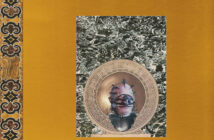
The hardest thing to do, in any artform but we’ll keep it focused on music here, is to make something that is truly joyful without becoming trite, sentimental or novelty. The world is awash with great works of melancholy, great works of anger, great works of desire, great works of desperation, great works of intellect, but few great works of joy. The members of Battles themselves have stated that the creation of their new album, Gloss Drop, was not a happy time, heightened by the departure of key member Tyondai Braxton. Yet the single word that comes to my mind when I listen through to the album really is joy. That it is a joy with depth is probably because of this very unhappiness underlying the works’ creation. Joy built on temporal happiness is trite, but that built on an understanding of the flipside has a proper foundation on which to work.
Opening track ‘Africastle’ is probably the most reminiscent of Braxton’s work with it’s faux orchestral flourishes echoing his real ones, building a tension across its opening minute and a half that breaks out into widescreen, head-nodding groove. It’s great, but it’s really just the set-up for the sucker-punch of ‘Ice-Cream’. I’m very happy to forgive the band for one if its few overt sonic references to another group. It’s hard to avoid the Animal Collective comparison but the fact is the track is a killer, no watering down involved – its chopped organ riff, interjecting guitar riffs and stuttering drums pure bliss. The little vocal/sampler duet to close out the track heightens the playfulness and pulls straight into ‘Futura’, the slightly darker, purely instrumental take on ‘Ice-Cream’s basic elements, which breaks out into, of all things, synthetic, distorted tin drum lead lines (that sound then reappears across the rest of the album, variously as mutated guitar or synth riffs). It’s an opening salvo of confident, accomplished brilliance.
The album continues in a similar vein. While the majority of the rhythms are actually fairly straight 4/4, the way each musical and rhythmic element plays around, across and counter to that pulse creates a kaleidescopic intricacy in which there is always something new to hear. Even at its most intense moments, such as when Gary Numan wails “My machines/sing songs for you/come inside” over a neo-industrial groove, the album makes me want to jump around with glee. Rhythm is the dominant factor across the album, with all the sounds harnessed under its banner. Micro-edits of guitar fire, cymbal crashes that cut abruptly, snare rolls from nowhere – all a glittering cosmos of detail that bear repeated listening. Smaller episodes such as ‘Dominican Fade’ and ‘Toddler’ add contrasts of texture and tone.
When it comes to rock based musics a decade into the new millenium, it seems to me that most of the things that could legitimately be regarded as forward looking appear to be coming from relative old-timers. While 80s electro-rock, 70s prog/psych and 60s garage and folk-rock have all had armies of young devotees finding inspiration in their shadows, to both positive and negative effect, sounds that have been startling in their newness and reliance on recent innovation have been much more difficult to find. While there are clear lineages back to math-rock and IDM in Battles’ music, nothing sounds like a rehash, everything feels like this could really be the future. The fact that it’s so much fun, so joyful, so playful and so assured bears testament to the group members’ individual histories and their collective confidence.
Adrian Elmer



